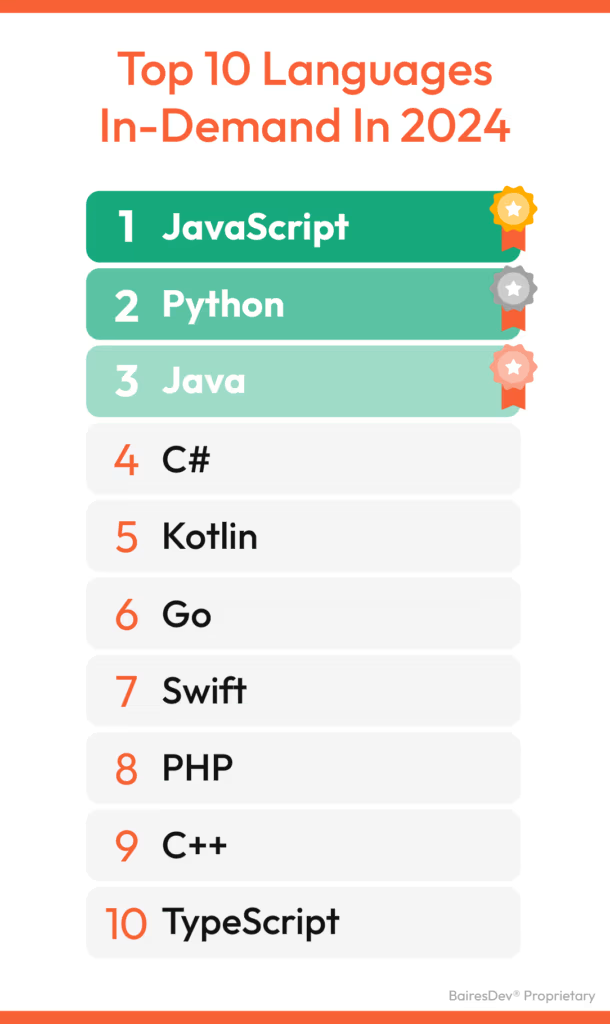Whether they are within the technology industry or not, all modern organizations must take steps to use digital tools effectively. A recent McKinsey Digital article stated, “More and more traditional companies are realizing that to compete and grow in a digital world, they must look, think, and act like software companies themselves.” Software developers, are already critical for furthering companies’ digital agendas.
The software developer role will become even more so in 2024 and the years that follow. One of the leading reasons is that its scope has expanded with the emergence of new technologies such as cloud computing, artificial intelligence (AI), and blockchain. Further, as the digital world expands, so does the need for cybersecurity solutions.
Virtual reality (VR) and augmented reality (AR) are other areas in which developers are needed more than ever. As the market for AR and VR software used to power innovative solutions is still new, the industry requires developers to use their expertise and creativity to customize them. Watch an expert’s take on key software development trends in 2024.
This expansion of the developer role comes at a time when many have thought it would be diminished with the appearance of AI-generated code. Yet, developing code with AI-powered support paves the way for developers to take on additional responsibilities, such as overseeing the use of non-human-generated code. Other new tools, such as low-code and no-code (LCNC) development, also require human oversight.
The Scope of the Profession Has Expanded
The scope of the software development profession has expanded since around the year 2000. During that time, technologies like cloud computing, AI, blockchain, and many other advancements have emerged. Because innovation is increasing, businesses will require more experts in these fields. In addition to the many new technologies, there are also many new hardware systems that use them.
Now, phones, tablets, cars, and TVs include software components. To get the most focused knowledge, manufacturers of these items require software developers who specialize in them and know the appropriate software languages, such as Dart, TypeScript, Pony, Python 3, Rust, and Swift. A consensus among tech voices reports that these are the most in-demand programming languages for 2024:

In addition to being knowledgeable about specific hardware and software languages, software developers must be adept at particular processes. They must also know how to work in tandem with business operations roles to ensure software products are developed and delivered quickly and efficiently.
Therefore, software developers with skills in continuous integration (CI), continuous delivery (CD), and other methodologies will be in higher demand. According to coding educator freeCodeCamp, “[The CI/CD] approach involves frequent code integration, automated testing, and continuous deployment of software changes to production.”
AI-Generated Code Is Not Foolproof
Generative AI tools like ChatGPT have made a mark, especially in software code creation. However, it’s crucial for companies to responsibly use AI-generated code by verifying its integrity and ensuring compliance with established rules and protocols.
While generative AI aids in software development, it can’t replace developers entirely. According to a recent KnowledgeHut blog post, even if AI could write all company code, software engineering experts would still be essential for development, maintenance, and improvement. So, software developers won’t be replaced, but they may take on more managerial roles.
Using generative AI tools this way offers substantial benefits. Developers can enhance productivity by reducing code generation time, allowing more focus on improving testing processes, resulting in higher-quality code and better software overall.
The Use of the Cloud Is Increasing
Just as downloads have replaced physical discs as the standard way to use software, cloud computing is replacing on-prem hardware installations as the standard way to host applications and create development environments. This transition has many reasons, whether they relate to security, scalability, agility, or collaboration. Cloud computing is essential in many companies today, and its use will continue to grow, although perhaps with a twist. A recent Forbes Tech Council article suggests that companies will look into private cloud infrastructures and focus on equipment deployment at the edge, due to the cloud’s cost, complexities, and associated loss of control.
Regardless of the chosen infrastructure, software developers will be tasked with ensuring the smooth functioning of cloud computing. Developers who work with cloud solutions can take on roles such as cloud architect, security expert, engineer, or administrator. All these positions provide ample opportunities for advancement and flexible working conditions.

The Evolution of Software Development
A recent Forbes Technology Council article points out that, while tech companies have made news recently for laying off technology workers, they are far from being the only ones that hire professionals with these skills. It states that “the top industries currently hiring software developers include finance and insurance, healthcare, automotive and manufacturing.”
New technologies are constantly appearing that might require the need for senior software developers. The U.S. Bureau of Labor Statistics predicts a growth rate of 25% in the need for this profession between now and 2032, a rate it considers “much faster than the average for all occupations.” It further states, “About 153,900 openings for software developers, quality assurance analysts, and testers are projected each year, on average, over the decade.”
U.S. News & World Report listed Software Developer as the #1 best job for 2023. Given the breadth of opportunities explored here, and the chance to constantly create, software development is poised to continue going strong in 2024 and beyond.








